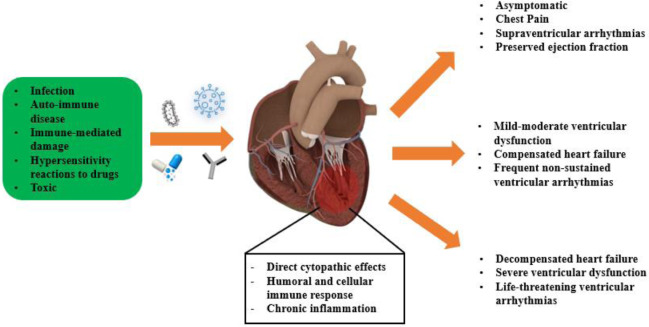Table of Contents
ToggleTopic 3.4.3: Inflammatory Disorders of the Heart and Blood Vessels
INFLAMMATORY DISEASES OF THE HEART
Introduction
Inflammatory diseases of the heart refer to a diverse group of conditions characterized by inflammation affecting different layers of the heart. This inflammation can impact the heart's ability to pump blood effectively, leading to a range of symptoms and potential complications. The specific location and extent of inflammation determine the clinical presentation and management strategies.
The three primary types of inflammatory heart diseases are:
- Myocarditis: Inflammation of the myocardium (heart muscle).
- Pericarditis: Inflammation of the pericardium (the protective sac surrounding the heart).
- Endocarditis: Inflammation of the endocardium (the inner lining of the heart chambers and valves).
Causes of Inflammatory Diseases of the Heart
Inflammation in the heart can be triggered by a variety of factors, including:
- Viral: Common culprits include coxsackievirus B, adenovirus, influenza virus, parvovirus B19, and herpesviruses.
- Bacterial: Such as streptococcus (leading to rheumatic fever), Staphylococcus aureus, and other bacteria causing infective endocarditis.
- Fungal: Less common, but can occur in immunocompromised individuals.
- Parasitic: For example, Chagas disease (Trypanosoma cruzi) can cause severe myocarditis.
General Clinical Manifestations of Inflammatory Diseases of the Heart
While specific symptoms vary depending on the affected part of the heart, some general signs and symptoms can be present across different inflammatory heart conditions:
- Chest Pain: Varies in character and location depending on the specific inflammatory condition (e.g., sharp and pleuritic in pericarditis, more diffuse in myocarditis).
- Dyspnoea (Shortness of Breath): Can occur at rest or with exertion, and may worsen when lying flat (orthopnea) due to fluid accumulation or impaired heart function.
- Fatigue and Weakness: Generalized tiredness and lack of energy are common due to the body's inflammatory response and reduced cardiac output.
- Palpitations: Sensations of a rapid, irregular, or pounding heartbeat, often due to arrhythmias triggered by inflammation.
- Fever: A low-grade fever is frequently present, especially in acute inflammatory processes.
- Malaise: A general feeling of discomfort, uneasiness, or illness.
- Flu-like Symptoms: May precede or accompany the cardiac symptoms, including muscle aches, joint pain, and headache, particularly in viral infections.
- Edema (Swelling): Swelling in the ankles, feet, or abdomen can occur due to fluid retention caused by impaired heart function, especially in chronic or severe cases.
- Syncope or Near-Syncope: Fainting or feeling faint due to transient reduction in blood flow to the brain, possibly from arrhythmias or severe heart dysfunction.
- Cough: Can be present, especially if there is pulmonary congestion due to heart failure.
- Changes in Voice (Hoarseness, Aphonia): Less common, but can occur if inflammation affects nerves near the heart (e.g., recurrent laryngeal nerve).
- Dysphagia (Difficulty Swallowing): Rare, but possible if severe inflammation or effusion puts pressure on the esophagus.
- Cyanosis: Bluish discoloration of the skin or mucous membranes, indicating poor oxygenation, typically seen in severe cases of heart failure.
- Distended Neck Veins (Jugular Venous Distension): Visible bulging of the neck veins, indicating increased pressure in the right side of the heart.
- Anxiety: Can be a direct symptom or a psychological response to the discomfort and uncertainty of the illness.
- Differences in Pulse and Blood Pressure in Upper Extremities: May suggest specific conditions like aortic dissection or certain types of vasculitis, which can sometimes be associated with inflammatory heart disease.


This notes are really educative